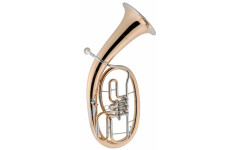The hotline is currently not manned. You can reach us again on Saturday, 27.04.2024 at 09:30.

Traditionelle europäische Handwerkskunst seit 1842
Die Instrumente aus dem Hause Cerveny gewannen schon im 19. Jahrhundert viele internationale Preise, unter anderem auf den Weltausstellungen 1889 in Paris und 1893 in Chicago. Im 20. Jahrhundert wuchs das tschechische Unternehmen zu einem der weltweit größten Hersteller von Metallblasinstrumenten heran. Auch heute noch setzt Cerveny mit seinen hochwertigen Instrumenten international Standards.

Weicher, warmer Klang
Das Tenorhorn CTH-721-4R ist aus Goldmessing gefertigt, das weicher und wärmer als andere Materialien klingt. Der Becherrand aus Neusilber erhöht die Stabilität des Schallstücks und ist vor allem bei dem weicheren Goldmessing von Vorteil.
Lange Lebensdauer
Das Mundrohr ist am anfälligsten für Korrosion. Das Material Neusilber, aus dem das Mundrohr des Tenorhorns gefertigt ist, erhöht die Lebensdauer signifikant. Auch die Maschine - Ventilbüchsen und Ventilausgänge - dieses schönen Instrumentes ist aus Neusilber gefertigt.
Doppelte Minibal-Gelenke
Die Minibal-Gelenke garantieren einen noch perfekteren und zuverlässigeren Lauf der Ventile.
Specification
- Product number 00048325
- Colour Brass
- for children No
Reviews


Questions about product
Question by Peter Wallimann on 30.03.2020
I am looking for a tenor horn, which is suitable mainly for the upper pitches, c''' and higher. I came across the Cerveny. Or would you recommend another one?
Currently I play mainly with euphonium.
Answer by Musikhaus Kirstein:
The Cerveny 721-4R is more of an all-rounder, a classic tenor horn that still responds well in the middle and low registers and has a nice sound. For the high register, I would rather recommend the B&S Bb tenor horn 3032/2-L ( https://www.kirstein.de/Tenorhoerner/B-S-B-Tenorhorn-3032-2-L.html ) or the Miraphone Bb-47 tenor horn ( https://www.kirstein.de/Tenorhoerner/Miraphone-Bb-47-Tenorhorn-Goldmessing.html ). Both are classically 3-valve, but can also be ordered as 4-valve. Furthermore, you should choose a smaller mouthpiece if you want to go high.
Question by Rainer Schneider on 23.12.2018
Where is the difference between bore Ø: 13.2 mm and bore Ø: 15.2 mm .
with bore Ø: 13,2 mm you need less air than with bore Ø: 15,2 mm .
Does this also have to do with the response and for higher tones, for example, with bore Ø: 13.2 mm.
Please for info
Greetings
Rainer Schneider
Answer by Musikhaus Kirstein:
The bore of the instruments plays a major role. With the 13.2 mm bore, the response is easier and playing in the higher pitches is easier. For tenor horn players who have to play very high for a long time, the instrument is perfect. However, the sound volume, especially in the middle and low registers, is smaller than that of the baritone with the large bore. With a 15.2 mm bore, you have a much larger sound volume, which is clearly audible in the middle and low registers. In the high registers, playing is more difficult, but is rewarded with a huge sound. Especially it depends on which voice the instrumentalist plays. Depending on whether he plays the tenor horn or baritone voice, I recommend the respective instrument. As an advanced instrumentalist with a powerful embouchure and proper air control, I recommend the baritone with the 15.2 mm bore.
Finanzierung
easyCredit Ratenkauf

- 2 to 60 months term
- Financing from 63,00 € / month
- More information about installment purchase
ConsorsFinanz Finanzierung
- 6 to 72 months term
- 0% financing for 233,25 € per month
- More information on financing

| Term (months) | Monthly rate | Tied annual interest rate Debit interest | Effective annual interest rate | Total amount |
| 6 | 466,50 € | 0,00 % | 0,00 % | 2799,00 € |
| 12 | 233,25 € | 0,00 % | 0,00 % | 2799,00 € |
| 18 | 162,66 € | 5,74 % | 5,90 % | 2927,88 € |
| 24 | 123,73 € | 5,74 % | 5,90 % | 2969,52 € |
| 30 | 100,38 € | 5,74 % | 5,90 % | 3011,40 € |
| 36 | 84,82 € | 5,74 % | 5,90 % | 3053,52 € |
| 42 | 73,72 € | 5,74 % | 5,90 % | 3096,24 € |
| 48 | 65,40 € | 5,74 % | 5,90 % | 3139,20 € |
| 54 | 58,94 € | 5,74 % | 5,90 % | 3182,76 € |
| 60 | 53,78 € | 5,74 % | 5,90 % | 3226,80 € |
| 66 | 49,56 € | 5,74 % | 5,90 % | 3270,96 € |
| 72 | 46,05 € | 5,74 % | 5,90 % | 3315,60 € |
| 3 Year warranty | |
| 30 Day Money Back | |
| Price Match Guarantee | |
| Over 2.000.000 satisfied customers |
The hotline is currently not manned. You can reach us again on Saturday, 27.04.2024 at 09:30.
| Saturday | 09:30 - 13:30 | |
| Monday | 09:30 - 18:00 | |
| Tuesday | 09:30 - 18:00 | |
| Wednesday | Closed |
Different opening times |
| Thursday | 09:30 - 18:00 | |
| Friday | 09:30 - 18:00 |





